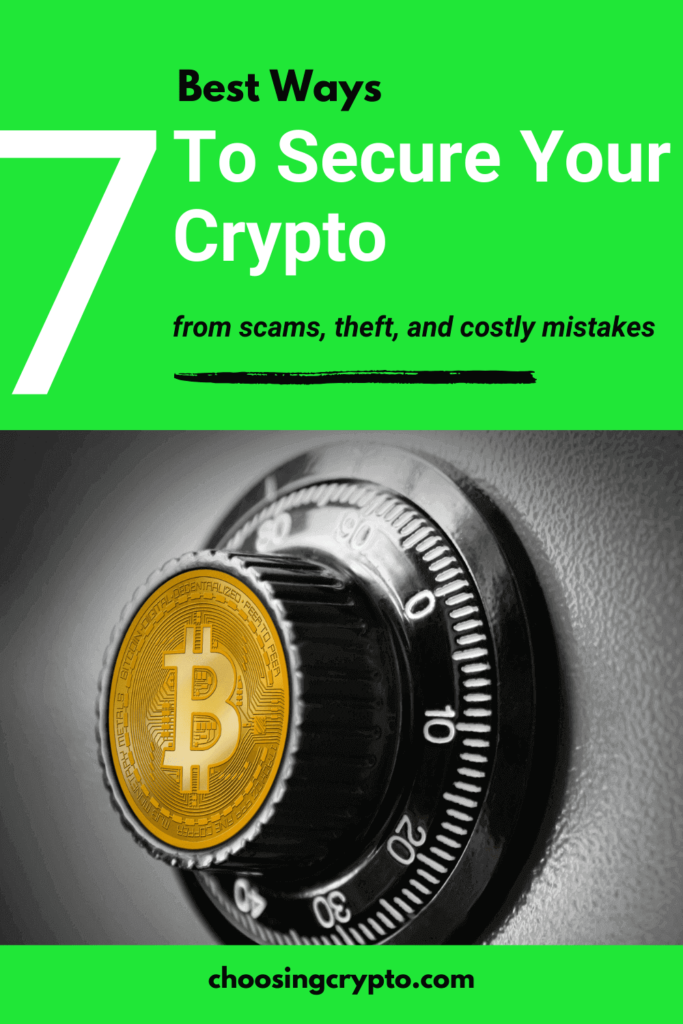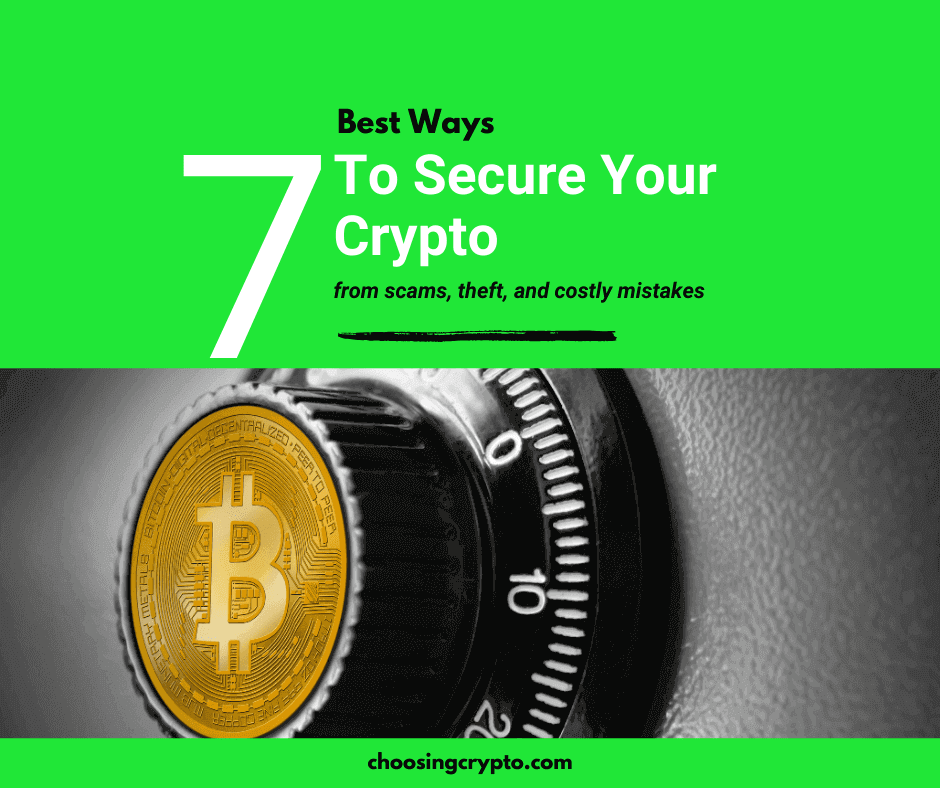In 2024 alone, scammers stole over $10 billion in cryptocurrency. Imagine you log into your crypto account and everything’s gone. No warning. No alerts. Just zero balances and no way to trace them.
It doesn’t matter if you’re holding $300 or $300,000. The risk is the same. One weak password, a fake app, or a wrong click can wipe out your balance.
Many think it won’t happen to them. Until it does. And by then, there’s no fixing it.
If you own crypto, you need to take steps to protect it. If you don’t, you’re an easy target for hackers, scammers, and costly mistakes.
This guide walks you through simple, proven ways to secure your crypto. These are the same strategies experienced users rely on, and they’re easier to implement than you might think.
New to crypto? I offer beginner-friendly 1-on-1 coaching, and your first session is free. Check it out here.
7 Best Ways to Secure Your Crypto
Here’s a concise guide on the 7 best ways to secure your crypto from scams, theft, and costly mistakes.
1. Use a Strong and Unique Password
Your password is the first line of defense for protecting your crypto accounts. Yet, weak or reused ones are behind 81% of hacking-related breaches (Verizon). A strong password should be 12–16 characters long and include a mix of letters, numbers, and symbols. It should avoid obvious picks like names, birthdates, or “123456.”
Also, never reuse passwords because if one account gets hacked, others are at risk.
Use password managers instead. A password manager helps by generating and storing complex passwords for every account.
Updating your passwords regularly is another effective way to secure your crypto accounts. I change mine every three months, a small habit that adds protection.
2. Enable Two-Factor Authentication (2FA)
Even the strongest password can be cracked. That’s why 2FA is essential. It adds a second layer of protection. Without it, anyone with your password can access your account. With it, they’ll need a code from your device to log in.
Use both login and withdrawal authentication for full coverage. SMS-based 2FA is risky due to SIM-swapping, so stick with apps like Google Authenticator or Authy. They generate codes directly on your device, making them far more secure.
Personally, I use a 2FA app to secure my crypto accounts, along with extra layers like email, FaceID, and SMS. The more barriers, the better.
3. Avoid Public Wi-Fi for Transactions
To use public Wi-Fi for crypto activities is like shouting your bank PIN in a crowded room. These networks are often unsecured, making it easy for hackers to intercept your data through man-in-the-middle (MITM) attacks. Your login details and private keys are exposed.
One of the best ways to protect your cryptocurrencies is by using secure home networks or mobile data for any crypto activity. If public Wi-Fi is your only option, use a trusted VPN to encrypt your connection.
Personally, I avoid public Wi-Fi when dealing with crypto. On rare occasions when I can’t, I always use a VPN. A few extra seconds of caution can save you from serious loss.
4. Avoid Unreliable Crypto Exchanges
Not all crypto exchanges are safe. Some are outright scams, others have collapsed without warning, like FTX in 2022 and QuadrigaCX in 2019. Mt. Gox is another one that lost 850,000 BTC that belonged to users in a 2014 hack.
If you must protect your crypto, stick to well-known, secure exchanges like Binance, Bybit, or Gate.io. Look for exchanges with cold storage, insurance, and transparent security practices.
Even with trusted names, don’t keep all your crypto in one place. Spread your holdings across platforms to reduce risk.
A little research and caution go a long way in securing your crypto.
Most people protect their crypto the wrong way. I’ll show you the right way. Your first session is free. Start here.
5. Double-Check Wallet Addresses
In crypto, sending funds to the wrong address means they’re gone for good, no reversal. Clipboard malware makes this worse by secretly replacing the address you copy with a hacker’s. If you don’t check, your crypto goes straight to them.
To avoid this, always verify the wallet addresses you copied before hitting send. At a minimum, confirm the first and last four characters. For large amounts, review the entire address.
In all you do, never rush a crypto transaction. One small mistake is all it takes, so always double-check before you send.
Think you’re safe from transfer mistakes? Don’t miss these crucial tips: 5 Most Dangerous Crypto Transfer Mistakes You Need to Avoid Now.
6. Beware of Phishing Scams
Phishing scams are a serious threat. They trick you into giving up sensitive info—like passwords, private keys, or seed phrases. Once stolen, your crypto is gone for good.
Scammers often pose as exchanges or wallet providers, sending emails or messages asking you to “verify” your account or share your seed phrase. Some create fake websites or apps that look legit.
To stay safe, never click on links in unsolicited messages. Instead, verify URLs before entering logins and contact platforms through official channels. Enabling anti-phishing codes on your exchange accounts is another way to beat phishing scams.
Remember, real platforms will never ask for your private info.
7. Use Cold Wallets for Long-Term Storage
If you’re holding large amounts of crypto long-term, don’t rely on exchanges or hot wallets. They’re convenient but always online, which makes them vulnerable to hacks, breaches, and insider threats.
Cold wallets, like hardware or paper wallets, store your crypto offline, keeping it safe from online attacks. I keep most of my holdings in a hardware wallet and only leave small amounts online for active trading.
Yes, hardware wallets have an upfront cost, but the peace of mind is worth it. For serious investors, they’re the safest choice.
When it comes to long-term storage, offline is the way to go.
Want personal help with crypto? I offer 1-on-1 coaching, and your first session is free. Book your free session here.
Additional Resources:
- Best Security Practices for All Cryptocurrency Users
- 5 Trusted Crypto Exchanges to Use
- Most Common Crypto Scams and How to Avoid Them
And guess what? We’re also on Instagram and Twitter(X). Join us there for even more fun and useful content!

DISCLAIMER:
The information provided here is for informational purposes only. Do not rely solely on it for making investment decisions. It is not financial, tax, legal, or accounting advice. Always do your own research or consult a financial advisor before investing in cryptocurrency.
